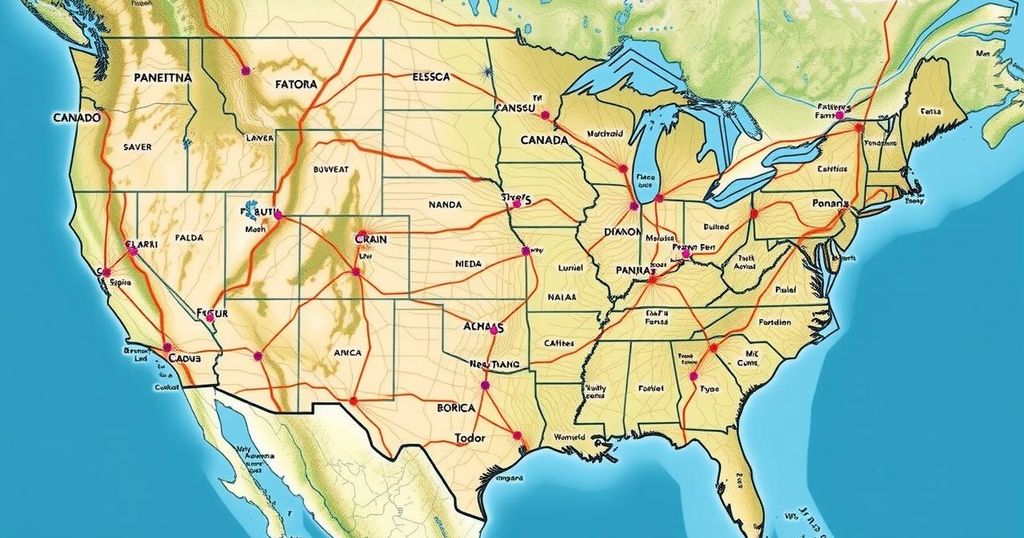World news
ALASKA, AMERICA, ARIZONA, ASIA, ATLANTIC, BIDEN ADMINISTRATION, CANADA, CNN, CNN POLITICS, DONALD TRUMP, EUROPE, EUROPE/ASIA, FENTANYL LABS, GREENLAND, LOUISIANA, LOUISIANA PURCHASE, MEXICO, NATIONAL SECURITY, NORTH AMERICA, PACIFIC, PANAMA, PANAMA CANAL, PHILIPPINES, POLITICS, RUSSIA, TRUMP, TRUMP ADMINISTRATION, U.S. ELECTIONS, UNITED STATES, US
Amira Khan
0 Comments
Trump’s Provocative Territorial Expansion Remarks on Canada, Greenland, and Panama
President-elect Donald Trump has toyed with the idea of U.S. expansion by suggesting the annexation of Canada, the acquisition of Greenland, and the seizure of the Panama Canal. His remarks blur the lines between serious policy proposals and attention-seeking rhetoric. The responses from leaders in denial exemplify modern diplomatic sentiments about sovereignty and territorial integrity.
In a recent display of provocative rhetoric, President-elect Donald Trump has hinted at potential territorial expansion for the United States, suggesting the incorporation of Canada as the 51st state and expressing interest in the acquisition of Greenland and the Panama Canal. Trump’s comments, which draw parallels to historical events such as the Louisiana Purchase, raise questions about his seriousness regarding these proposals, often blurring the lines between genuine policy ambitions and strategic posturing intended to capture media attention and galvanize his base.
During his remarks at a conservative gathering, Trump characterized ownership of Greenland as an “absolute necessity” for national security. Simultaneously, he warned Panama officials about the potential consequences of not reducing fees for U.S. ships transiting the Panama Canal, framing it as a critical national asset that the U.S. had controlled until 1999. Such suggestions echo the 19th-century doctrine of Manifest Destiny, suggesting an aggressive push for U.S. expansionism despite Trump’s previous assertions advocating for reduced foreign intervention.
Further complicating the dialogue, Trump’s transition team refrained from clarifying whether these statements reflect true strategic intentions or additional provocations. Advisors speculate Trump’s focus on trade policies and the treatment of American businesses abroad may have influenced his renewed interest in the Panama Canal. Notably, Trump also encouraged designating drug cartels in Mexico as foreign terrorist organizations, potentially setting the stage for military action on foreign soil, which raises significant implications for U.S.-Mexico relations.
Reactions to Trump’s assertions have been swift, especially from leaders in Panama and Denmark, who firmly rejected any notion of negotiating territory or control over the canal. Panama’s President José Raúl Mulino emphasized that ownership of the canal is “not negotiable,” and the Prime Minister of Greenland reiterated that the territory “is ours” and “will never be for sale.”
In the context of international relations, Trump’s antics regarding Canada now appear less serious, likely intended as a psychological tactic post his recent meeting with Canadian Prime Minister Justin Trudeau. Overall, Trump’s provocations reveal a complex interplay of nationalism, foreign policy, and tactics aimed at negotiating international relations while asserting U.S. dominance.
The notion of American territorial expansion was historically significant, particularly during the 19th century when Manifest Destiny justified the U.S. claim over vast territories. Trump’s recent comments regarding potential annexations evoke this historical context, suggesting a return to an expansionist ideology. His statements about Greenland, Canada, and the Panama Canal challenge the modern diplomatic landscape, highlighting a potential shift toward nationalist policies. Additionally, Trump’s rhetoric on drug cartels intersects with national security concerns, employing tough talk as a means of negotiating foreign relations, particularly with Mexico. Trump’s administration’s past focus on tariffs and trade relations also plays a critical role in shaping these discussions and the overall strategy for dealing with neighboring countries. The responses from foreign leaders to Trump’s provocations underscore a global reluctance to entertain discussions of U.S. territorial claims, emphasizing the contemporary sovereignty of nations that were once under U.S. control or influence.
President-elect Donald Trump’s recent comments regarding the potential absorption of Canada, the acquisition of Greenland, and the control of the Panama Canal serve not only to provoke foreign leaders but also to emphasize a nationalistic agenda. While the seriousness of these proposals remains in question, they reflect a broader strategy that intertwines claims of American territorial expansion with pressing national security issues. The firm rebuttals from leaders of Panama and Denmark highlight the complexities of contemporary international relations in the face of U.S. provocations.
Original Source: www.cnn.com




Post Comment